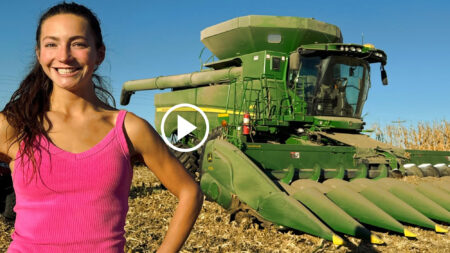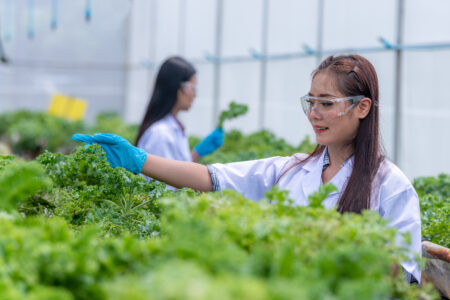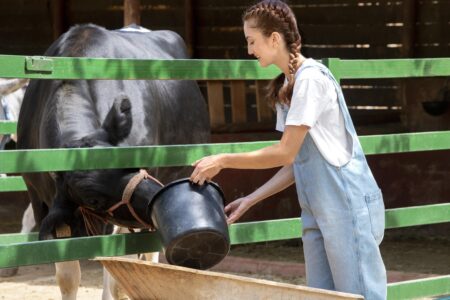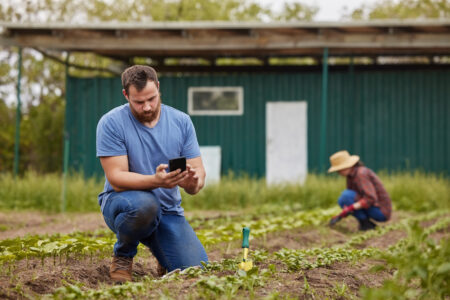Agriculture is the backbone of global food production and an essential sector that sustains human life. While it often conjures images of farmers toiling in fields, it’s crucial to recognize the pivotal role that women play in this industry. Women have been historically involved in agriculture worldwide, contributing significantly to food security, rural economies, and sustainable development. In this article, we will explore the multifaceted role of women in agriculture, examining their contributions, challenges, and the ongoing efforts to empower and support them.
Section 1: Women in Agriculture – An Overview
1.1 Historical Perspective
Throughout history, women have been the stewards of agricultural knowledge and practices, passing down traditions from one generation to the next. In agrarian societies, women were responsible for tasks such as planting, harvesting, seed preservation, and animal husbandry. Their expertise in managing crops and livestock was invaluable to their communities’ survival.
1.2 Contemporary Context
In contemporary agriculture, women’s roles have expanded beyond traditional practices. They are actively involved in various aspects of farming, agribusiness, and rural development. Women now serve as agricultural laborers, landowners, entrepreneurs, researchers, and policymakers, contributing significantly to the sector’s growth.
Section 2: Key Contributions of Women in Agriculture

2.1 Crop Cultivation
Women play a pivotal role in crop cultivation, from planting and weeding to harvesting and post-harvest management. Their expertise in sustainable farming practices, such as crop rotation and organic farming, contributes to the preservation of soil fertility and biodiversity.
2.2 Livestock Management
Women are often responsible for managing livestock, ensuring their health, nutrition, and productivity. This includes tasks like feeding, milking, and animal healthcare. In many rural areas, women are the primary caregivers for poultry, cattle, goats, and other livestock.
2.3 Seed Preservation and Crop Diversity
Women have historically been guardians of traditional seeds and plant varieties. Their knowledge of seed saving and exchange helps preserve crop diversity, ensuring resilience in the face of changing environmental conditions and pests.
2.4 Sustainable Agriculture Practices
Women are at the forefront of adopting and promoting sustainable agricultural practices. Their contributions to organic farming, agroforestry, and integrated pest management support ecological balance and reduce the use of harmful chemicals.
2.5 Food Processing and Preservation
Women are often responsible for food processing and preservation, ensuring that agricultural produce is stored, processed, and made available year-round. This includes techniques like canning, drying, and pickling.
2.6 Agribusiness and Marketing
In many regions, women are actively engaged in agribusiness and marketing. They sell produce in local markets, operate food processing units, and participate in value-added activities like making jams, jellies, and handicrafts.
2.7 Rural Development
Women’s involvement in agriculture extends to rural development initiatives. They play active roles in community-building, social enterprises, and cooperatives, contributing to the economic and social development of rural areas.
Section 3: Challenges Faced by Women in Agriculture

While women make significant contributions to agriculture, they also face numerous challenges that hinder their full participation and potential:
3.1 Access to Land and Resources
In many countries, women have limited access to land and property rights, which restricts their ability to make decisions about farming practices and income. They also face disparities in accessing credit, agricultural inputs, and extension services.
3.2 Gender-Based Discrimination
Gender-based discrimination and cultural norms often limit women’s participation in decision-making processes within farming households and agricultural cooperatives. This restricts their influence over resource allocation and farm management.
3.3 Lack of Education and Training
Inadequate access to education and training opportunities hinders women’s capacity to adopt modern agricultural practices and technologies. It limits their ability to innovate and adapt to changing farming conditions.
3.4 Unpaid Labor
Women’s contributions to agriculture are often undervalued and unpaid. Their extensive work in food preparation, child care, and household chores leaves them with less time and energy for income-generating activities.
3.5 Health and Safety Risks
Women working in agriculture face health and safety risks, particularly when handling chemicals or operating machinery. Limited access to healthcare and safety measures puts their well-being at risk.
3.6 Market Access and Economic Opportunities
Limited access to markets and financial services prevents women from fully benefiting from their agricultural enterprises. They often face price discrimination and challenges in negotiating fair prices for their produce.
Section 4: Empowering Women in Agriculture

Recognizing the importance of women in agriculture and addressing the challenges they face is essential for achieving food security and sustainable development. Here are some strategies and initiatives aimed at empowering women in agriculture:
4.1 Legal Reforms
Many countries are implementing legal reforms to grant women equal rights to land and property. These reforms aim to strengthen women’s land tenure security and decision-making authority.
4.2 Education and Training
Investing in women’s education and providing training in modern agricultural techniques and technologies can enhance their productivity and decision-making capacity.
4.3 Access to Credit and Financial Services
Facilitating access to credit, savings, and financial services for women in agriculture can help them invest in their farms, start businesses, and increase their economic independence.
4.4 Gender-Sensitive Extension Services
Extension services should be tailored to address the specific needs and challenges faced by women in agriculture. This includes providing training on nutrition, health, and safety.
4.5 Support for Women’s Cooperatives
Promoting the formation of women’s agricultural cooperatives can strengthen their collective bargaining power, increase market access, and improve their income.
4.6 Gender-Responsive Policies
Governments and international organizations should adopt gender-responsive agricultural policies that prioritize the needs and rights of women in agriculture.
4.7 Awareness and Advocacy
Raising awareness about the importance of women in agriculture and advocating for gender equality within the sector is crucial for achieving long-term change.
The role of women in agriculture is multifaceted and indispensable. Their contributions to food production, sustainable farming, and rural development are invaluable. However, women in agriculture continue to face numerous challenges that limit their full potential.
Efforts to empower women in agriculture must encompass legal reforms, education, access to resources, and gender-sensitive policies. Recognizing and addressing the gender disparities in agriculture is not only a matter of social justice but also crucial for achieving food security, economic growth, and environmental sustainability.
By acknowledging the vital role of women in agriculture and working towards gender equality within the sector, we can harness their potential to feed the world, protect natural resources, and build resilient and sustainable food systems for future generations.















3 Comments
I need job please help me
Je veux travailler avec vous
Hi My name is Marcos, I’m from Brazil. I want to go there to take a course and invest in agriculture, but the situation here is chaotic for me. If I had money I would have been there for a long time.